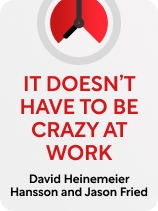

This article is an excerpt from the Shortform book guide to "It Doesn't Have to Be Crazy at Work" by David Heinemeier Hansson and Jason Fried. Shortform has the world's best summaries and analyses of books you should be reading.
Like this article? Sign up for a free trial here.
What are the best hiring criteria for recruiters to follow? Should you look for the best of the best in your line of work?
Most companies get skilled employees by identifying the most talented workers in their industry and stealing them away from other companies. However, Jason Fried and David Heinemeier Hansson advise against doing this.
Check out below what Fried and Hansson recommend doing instead.
Don’t Hunt for Talented Employees—Create Them
Transplanting successful employees from other companies can end in disaster if the new recruits struggle to adjust to your organization. Fried and Hansson argue that the more reliable strategy is to hire employees who show promise and help them reach their full potential.
(Shortform note: Some experts argue that training employees rather than poaching them from other companies doesn’t just result in better work. This approach also makes it more difficult for other companies to poach employees from you. Training employees to flourish at work is an act of support, and it leads people to believe that you’ll continue supporting them for as long as they work with you. Such well-supported employees are less likely to leave if other companies try to poach them. You can reinforce this promise of future support by mapping out long-term career paths at your organization.)
Three Effective Hiring Criteria
This mindset of creating rather than hunting for employees means that your hiring criteria will look different from the industry standard. Fried and Hansson recommend ignoring traditional résumé items such as a prestigious education or impressive past job titles. Instead, ask yourself three questions to determine whether someone has the potential to grow into an exceptional employee.
First, are they likable? For the good of the team, make sure to only hire people that everyone would be excited to work with.
(Shortform note: Gary Vaynerchuk (Crush It!) argues that an employee’s personality can be more important than the work they’re capable of doing. He elaborates that likable employees don’t just make the workplace more enjoyable, they also make it more productive. Antisocial employees force their coworkers to spend time figuring out how to avoid interpersonal conflict instead of getting real work done.)
Second, do they add a unique perspective to the team? Hiring people from a wide range of diverse backgrounds helps the team produce good ideas and better serve a wider range of customers.
(Shortform note: Diversity arguably yields these benefits not only on an organizational level, but also on the level of teams within your organization. In Range, David Epstein asserts that managers can spark more valuable insights by encouraging employees to periodically work with different teams, increasing the range of diverse backgrounds each team has access to.)
Third, what tangible work have they personally done? Fried and Hansson note that the work someone typically lists on their résumé is too vague or exaggerated to illustrate what they’re actually capable of. Use the interview to uncover what specific tasks they executed in past jobs rather than inferring their skill sets based on their previous work experience. This allows you to avoid onboarding workers who appear valuable on paper but end up being a costly mismatch.
For example, imagine you hire a former software engineer from a prestigious company to be a manager at your new tech startup. Unfortunately, the leadership responsibilities and disorganized startup environment are too overwhelming for them, and they end up resigning after six weeks. If you had instead hired someone who’d managed a scrappy team before, they likely would’ve succeeded as a manager for your startup.
(Shortform note: In Rework, Fried and Hansson elaborate on what they look for during the hiring process. They note that cover letters are often more reliable indicators of how well a candidate will fit than résumé credentials—a well-written cover letter demonstrates that the candidate is a good communicator (an invaluable skill) and reveals how passionate the candidate is about your specific organization. Judging a cover letter may be effective for the same reason as judging tasks applicants have done at past jobs: The cover letter itself is work they’ve produced entirely on their own and serves as firsthand evidence of their skills.)

———End of Preview———
Like what you just read? Read the rest of the world's best book summary and analysis of David Heinemeier Hansson and Jason Fried's "It Doesn't Have to Be Crazy at Work" at Shortform.
Here's what you'll find in our full It Doesn't Have to Be Crazy at Work summary:
- How today's "hustle culture" ruins the lives of many
- How you can establish more reasonable and sustainable goals
- The three qualifications to look for when scouting for any potential hire






